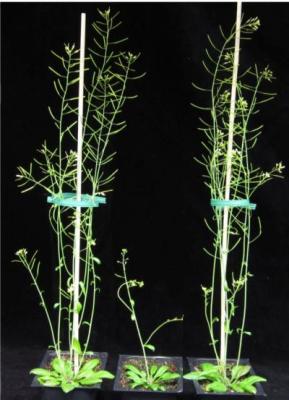Nov 27 2012
With increasing demands for sustainable energy, being able to cost-efficiently produce biofuels from plant biomass is more important than ever.
 This is an image of [wt_xylem deficient (Irx7)_restored function (pVND7::IRX7)]. Credit: Pia Petersen
This is an image of [wt_xylem deficient (Irx7)_restored function (pVND7::IRX7)]. Credit: Pia Petersen
However, lignin and hemicelluloses present in certain plants mean that they cannot be easily converted into biofuels. A study published in BioMed Central's open access journal Biotechnology for Biofuels appears to have solved this problem, using gene manipulation techniques to engineer plants that can be more easily broken down into biofuels.
Plants high in lignin and hemicelluloses – lignocellulosic biomass – have a high content of pentose sugars that are more difficult to ferment into fuels than plants with hexose sugars. In order to be useful for biofuel production, scientists need to be able to engineer plants with smaller amounts of xylan – the major non-cellulosic polysaccharide – present in secondary cell walls.
With this in mind, a research group from the Lawrence Berkeley National Laboratory, USA, used 3 mutant strains of Arabidopsis deficient in xylan – irregular xylem (irx) mutants irx7, irx8 and irx9 – in order to engineer plants with low xylan content and improved properties for easier breakdown of carbohydrate into simple sugars (saccharification). The irx mutants normally exhibit severe dwarf phenotypes that result from xylem vessel collapse and consequent impaired transport of water and nutrients. The team hypothesized that restoring xylan biosynthesis in the plants would complement the mutations.
To reintroduce xylan biosynthesis into the xylem of irx7, 8 and 9, Henrik Scheller and colleagues manipulated the promoter regions of vessel-specific VND6 and VND7 transcription factor genes. Significantly, they found that the ensuing phenotypes completely restored wild-type growth patterns in some cases, resulting in stronger plants with restored mechanical properties, whilst at the same time maintaining a low overall xylan content and improved saccharification properties that allowed for better breakdown into biofuels.
Plants with up to 23% reduction in xylose levels and 18% reduction in lignin content were obtained, whilst normal xylem function was restored. The plants also showed a 42% increase in saccharification yield after pretreatment.
Lead author Scheller said, "These results show that it is possible to obtain plants that have reduced amounts of xylan in their walls while still preserving the structural integrity of the xylem vessels. The xylan engineering system we present here is a great step towards tailored bioenergy crops that can be easily converted into biofuels. He continued, "This approach in Arabidopsis has the potential to be transferred to other biofuel crop species in the near future, in particular, the poplar species."
These results from this study provide hope that a viable alternative to fossil fuels may soon be available.